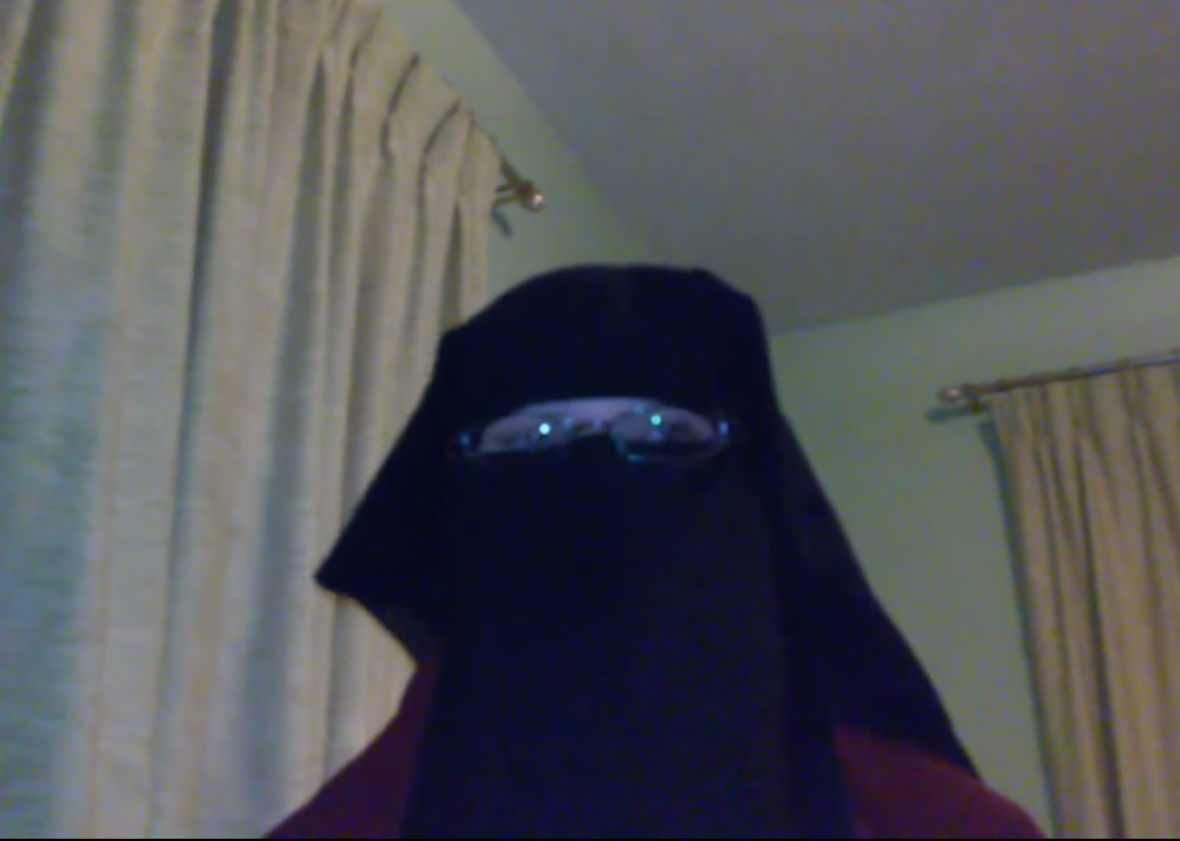On Aug. 24, Sumayyah Dawud, a transgender Muslim, uploaded an hourlong video to YouTube in which, her face covered with a full-face niqab veil, she tells the harrowing story of how officials at the Islamic Cultural Center of Tempe, Arizona, told her she needed to dress and pray like a man or provide medical proof that she is an anatomical woman.
The Phoenix New Times, which picked up the story, later provided more documentation about the ordeal. Dawud, who has been legally female since 2011, converted to Islam in 2013. As she recounts in the video, earlier this summer, toward the end of Ramadan, some community members went to the mosque’s board of directors saying they were uncomfortable that she prayed in the women’s section. (During prayers, men and women are separated at most mosques, including at the Tempe ICC.) Dawud provided government identification, which showed she was female, but she was told the board needed medical proof. As humiliating as that sounds, and as degraded as she felt, she acquiesced, providing medical documentation from her primary-care physician. Nedal Fayad, the chairman of the mosque’s board of directors, promised her that the documents would remain confidential, and she believed the question was resolved.
Alas, that wasn’t the end of the matter. A few weeks ago, after someone asked her to leave the women’s section because she “wasn’t really a woman,” she discovered that the board had held a secret meeting to discuss her situation. In that meeting, the board decided her medical documents weren’t sufficient. I wasn’t able to get in touch with Dawud, but the New Times explains that she was called into a meeting with Fayad, the imam, and two other ICC leaders.
One of the leaders “told me I was not allowed to use the women’s areas because ‘I had male biology,’ ” Dawud says. “I asked where he got that from, and he told me that I was the one who said that at the meeting with [Fayad] previously. I explained that I never said such a thing. He also said I had agreed from the prior meeting to stay out of the women’s section, which was also untrue.”
Then the imam “mentioned the medical document and stated he had read that and that the entire board had read it as well.”
Dawud says Fayad admitted to sharing the document without her consent, and admitted to discussing details of their supposedly private meeting.
“He said he had to show and share the information because the ‘imam needed a fatwa’ ”—a legal opinion about Islamic law. “I was then accused of deliberately deceiving the board [with the medical document] and of making [Fayad] ‘make a fool out of himself in front of the board,’ ” she adds. …
“They stated I would no longer be allowed to return to the property unless I either provide a document they would accept, at which point I would be admitted to the women’s areas as before or otherwise I would have to come dressed in men’s clothes, pray in the men’s area, and use the men’s restroom,” Dawud says.
“When I argued over this, [Fayad] stated he would call the police and have a restraining order placed on me.”
Dawud, seen here supporting a different Islamic Community Center in Phoenix at a rally organized by a group of people who view Islam as a violent religion, seems devout in her faith and remains devoted after her horrific inquisition. Unfortunately, there’s nothing new about religious women having a trouble finding their proper place as active participants within their faith groups. As I’ve documented before, they’ve opened their own mosques, had to sneak in tiny Torahs, and been interrogated for having “secular mentality,” aka helping the poor—but being a transgender woman takes the fight to a new level.
Many religions are becoming, or at least trying to become, more accepting of gay and lesbian adherents. It’s also becoming more accepted in the mainstream to identify as transgender, though mainstream religions still have a ways to go on that front. Of course, that doesn’t mean transgender women have stopped being practicing Muslims.
Two years ago, Lucy Vallender, another transgender convert to Islam, faced almost the exact same discrimination: She was barred from praying with women and asked a series of humiliating personal questions. In Indonesia, there’s a community of transgender women who call themselves Waria—a mixture of the Indonesian terms wanita, or woman, and pria, or man—who remain devout Muslims, although they’re not fully accepted in other communities.
While it’s easy to say that the correct answer is for the ICC of Tempe to treat Dawud like the woman she is, the reality is, sadly, more complicated. What these mosques, synagogues, and churches really need to do is educate. If they insist on separating men and women along gender lines, they have to explain what this means.
The New Times reports that the ICC posted a transgender policy after one of the interactions with Dawud—it has since been taken down—which stated that “those with male biology will be asked to leave female spaces.” This sounds hateful in tone, and reflects a fundamental misunderstanding of what it means to be transgender—but more to the point, if the board is going to demand proof of gender, does that mean that they’re going to verify the genitalia of all their congregants? (I called the ICC Tempe, but was not able to get through at the number provided on the website, and they did not return an email request for comment.)
As Ani Zonneveld, the president of the board of directors of Muslims for Progressive Values, told New Times, at MPV mosques, “everyone ‘prays Mecca-style’—not necessarily segregated by gender—so that ‘people can pray where they feel most comfortable.’ ” Of course, this is the exception, rather than the norm. It also doesn’t have to be the only solution.
